Scroll to:
A Comprehensive Approach to Security Management in Accommodation Facilities
https://doi.org/10.23947/2414-1143-2025-11-3-32-41
Abstract
Introduction. The article is devoted to relevant areas of improving security in hotel complexes. Traditional approaches to security management often focus on individual aspects of fire safety, labor protection, without taking into account the possibility of interrelation between various threats and risk factors. The introduction of a unified methodology for integrated security management will cover all areas of activity of accommodation facilities and take into account the diversity of threats. The purpose of the study is to develop and justify the need to implement an integrated approach to security management in accommodation facilities, ensuring a reduction in the risks of threats and an increase in the level of security for guests and staff.
Materials and Methods. The complex nature of the methods used in this study is due to the subject matter of the work, which covers the methodologies of sociology, pedagogy, philosophy and a number of economic disciplines related to the study of the specifics of safety management in the hospitality industry. The theoretical foundations of the study were determined through the analysis of literary sources, scientific works, regulatory documents and practical guidelines on safety management in the hospitality industry. This research employs methods of classification, system and comparative legal analysis.
Results. In the hospitality industry, creating a safe and comfortable environment for guests is a priority task. Hotels, as places with a high concentration of people, are complex objects in terms of security, which requires taking into account many technical aspects and organizational measures. This article examines the key aspects of security management in accommodation facilities, analyzes the main types of threats, as well as existing approaches to ensuring security, and examines the impact of various types of factors on the level of security in accommodation facilities. The result of the study is the development and justification of the need to implement a comprehensive approach to security management in accommodation facilities, integrating fire safety, anti-terrorist security, information security, and labor protection.
Discussion and Conclusion. Security management in accommodation facilities requires a comprehensive approach, including various aspects, from physical security to information and fire safety. A comprehensive approach involves integrating key security elements into a single system, the management of which should be based on continuous monitoring and risk analysis, regular updating of precautionary measures, and personnel training. The theoretical significance of the study lies in the development of the concept of integrated security management in accommodation facilities, the development of methodological foundations for the purpose of assessing the effectiveness of security systems. The practical significance lies in the possibility of using the proposed approach to improve the level of security in accommodation facilities and reduce the risk of threats.
For citations:
Petrenko A.S., Provotorina V.V. A Comprehensive Approach to Security Management in Accommodation Facilities. Science Almanac of Black Sea Region Countries. 2025;11(3):32-41. https://doi.org/10.23947/2414-1143-2025-11-3-32-41
Introduction. In the context of the constant growth of crime and the complication of the crime situation, the issue of ensuring the security of facilities, including accommodation facilities, is becoming a priority. The criminal world is not limited to interest in financial institutions, but accommodation facilities also become potential targets for committing illegal actions. The creation of an effective, reliable and comprehensive security system will ensure the hotel enterprise the image of a peaceful accommodation facility, guaranteeing guests peace of mind and confidence in their safety.
When developing a security system in accommodation facilities, it is necessary to take into account a number of features that distinguish them from industrial and commercial facilities. Firstly, hotel enterprises create an atmosphere of an open, hospitable home with a large number of guests, in connection with which security elements must be unobtrusive and sometimes even invisible, so as not to cause guests a feeling of fear, uncertainty about personal safety.
Secondly, the location of accommodation facilities in conditions of limited urban space requires a special approach and adaptation of security systems to the environment. This is due to the high density of development, active transport and pedestrian traffic, a high level of interaction between guests and local residents.
Thirdly, ease of access. Innovative technologies used in the hospitality industry offer guests a “contactless” check-in system, online booking, and the use of mobile phones/apps instead of keys. Undoubtedly, all this makes the process of servicing guests easier, but at the same time it contradicts the main goal of the hotel enterprise — to ensure a comfortable and safe stay.
An effective combination of technology and a humanistic approach will create a safe and comfortable environment, provide a high level of protection for guests and staff, and will be the key to successful work. The purpose of the work is to develop recommendations and form a comprehensive approach to security management in accommodation facilities through risk analysis, implementation of modern technologies, staff training and creation of effective emergency response procedures. The article is aimed at improving the security of guests and employees of accommodation facilities in the Rostov Region and the city of Rostov-on-Don, minimizing potential threats, ensuring a comfortable stay in hotel complexes.
Materials and Methods. The concept of security in the hotel business is complex and includes various tools. In order to develop a concept of security in hotels, as well as to identify the features of its implementation in practice, it is necessary to analyze international experience of both the functioning of the hospitality industry and security issues in hotels.
The following authors are devoted to the study of trends and features of the development of the hotel business in the world and in Russia: Mehmet Ali Köseoglu, Mehmet Altin, Eric Chan, Omer Faruk Aladag, 2020 [1], M.S. Oborin, 2018 [2], S.N. Moreva, E.V. Zobova, L.A. Yakovleva, 2017 [3], L.N. Kazmina, V.S. Makarenko, V.V. Provotorina, T.N. Grigorenko, G.E. Ekinil [4, 5].
The following authors are devoted to the issues of ensuring security in hotel enterprises: Peter E. Tarlow, 2014 [6], Charles Brossman, 2016 [7]. The following authors are devoted to the issues of ensuring fire safety in hotel enterprises: Xian-zhi Lv, Jian-yun Ma, Kun Tao, Feng Ma, Shuo Chen, Jie Yin, Xiang-min Zheng, Bin-bin Dong, Yi-nan Hu [8]. The issues of information security in a hotel are studied in the works of: Abraham Pizam, Ahmet Bulent Ozturk, Ahmet Hacikara, Tingting Zhang, Adela Balderas-Cejudo, Dimitrios Buhalis, Galia Fuchs, Tadayuki Hara, Jessica Meira, Raquel Garcia Mercedes Revilla, Deepa Sethi, Ye Shen, Olimpia State [9], Xuequn Wang, Jian Xu [10].
The research methodology is comprehensive, taking into account the multifaceted nature of the topic under consideration. The various general scientific methods used, including conceptual-logical and comparative analysis, will allow for a deeper understanding and assessment of the data obtained during the research, as well as the formulation of new trends and solutions to improve the level of protection.
Results. The hotel business is one of the most vulnerable business sectors, subject to vandalism, property theft and fires. It requires a serious approach to creating reliable protection from criminals, accidental fires, leaks, equipment failures and other circumstances. The concept of hotel security includes not only protection from criminal attacks, but even more so the creation of preventive measures to ensure protection from fire, explosion and other emergency events.
The organization of security in accommodation facilities affects a number of relevant areas (Fig. 1).
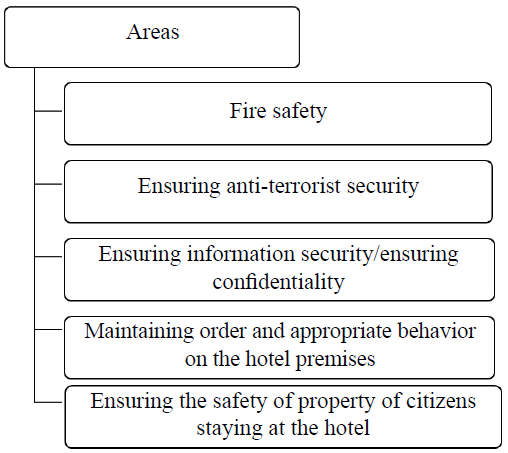
Fig. 1. Main areas of security in hotels
Fire safety is one of the most important aspects in the hotel industry. Explosion and fire hazard of hotels creates significant risks to the life and health of consumers and staff, and can lead to huge material losses.
Hotel enterprises are classified as objects related to the functional fire hazard class F1.2, which implies increased requirements for ensuring fire safety. Factors influencing the level of fire hazard in hotels include features of architectural planning solutions, a large number of flammable materials (furniture, decorative elements, bedding), as well as the presence of premises for various purposes (kitchens, restaurants, conference rooms, stages, saunas).
Ensuring the safety of people checking into hotels is important for the following reasons:
– guests find themselves in an unfamiliar environment, which makes it difficult to navigate in space and find emergency exits;
– fatigue due to time zone changes, a state of inhibition can lead to a slow reaction to alarm signals;
– the presence of a language barrier can become an obstacle to understanding instructions during an emergency;
– being on vacation can be accompanied by alcohol consumption, which can also lead to a slow reaction and an increased risk of fire.
Despite the fact that hotels provide temporary accommodation services for guests, during this period they must provide full protection in case of fires, smoke or other potentially dangerous situations. Prevention of fires, minimization of possible consequences in case of their occurrence is possible only subject to compliance with the requirements of legislation in the field of fire safety.
Table 1
Regulatory documents in the field of fire safety
| Normative legal act | Contents | Validity period |
|---|---|---|
| Resolution of the Government of the Russian Federation No. 1479 “Fire Safety Regulations in the Russian Federation”1 | Organization of fire safety at the protected facility | until 31.12.2026 |
| Federal Law of 21.12.1994 No. 69-FZ (as amended on 08.08.2024) “On Fire Safety”2 | Duties and responsibilities | not installed |
| Federal Law of the Russian Federation of 22.04.2012 No. 123-FZ (as amended on 25.12.2023) “Technical Regulations on Fire Safety Requirements”3 | Fire safety requirements | not installed |
| Order of the Ministry of Emergency Situations dated 11.18.2021 No. 8064 | Procedure for training in fire safety training programs | until 01.03.2028 |
The conclusion of the state fire supervision on the compliance of the protected object with fire safety requirements is a document confirming the fire safety of the hotel. In order to prevent and eliminate fires in accommodation facilities, a fire safety concept is developed and an effective system is created that can provide fire protection (Fig. 2). The main task of developing a fire safety concept is to create conditions that ensure maximum protection for guests and its employees. The presence of modern technical solutions in the hotel significantly increases the level of safety for guests and staff, minimizing the risk of fire.
In 2022, 328 fires occurred in buildings and premises for temporary stay (accommodation) of people (for the same period last year — 273, +20.1%), in which 12 people died. The statistics of fires in hotels was supplemented by the following events:
‒ 17.12.2023 — a fire in the Europa hotel complex in Astrakhan;
– 24.01.2024 — a fire in the Royal hotel and entertainment complex in Khabarovsk;
– 17.02. 2024 — a fire in the Druzhba hotel in Abakan.
A review of hotel fires revealed the main causes of their occurrence (Fig. 3).
Ensuring anti-terrorist protection of a hotel is the responsibility of the business owner, aimed at the safe functioning of the facility, minimizing the likelihood of terrorist attacks against the hotel and minimizing their consequences. The presence of protocols and knowledge of various scenarios will allow the staff to quickly respond to emergency situations, minimize their consequences and ensure both their own safety and the safety of their guests (Table 2).
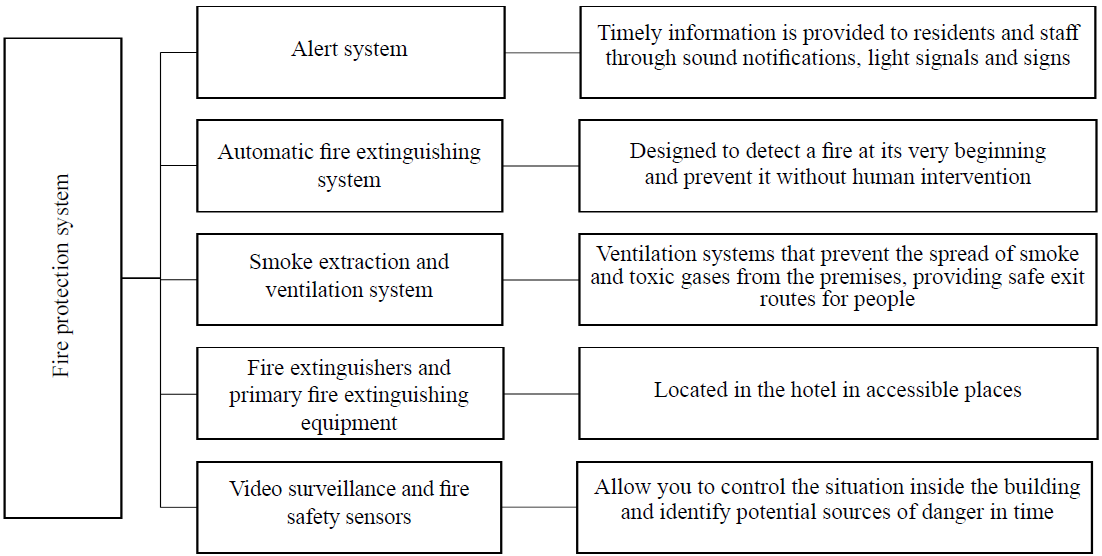
Fig. 2. Typical fire protection system for hotels
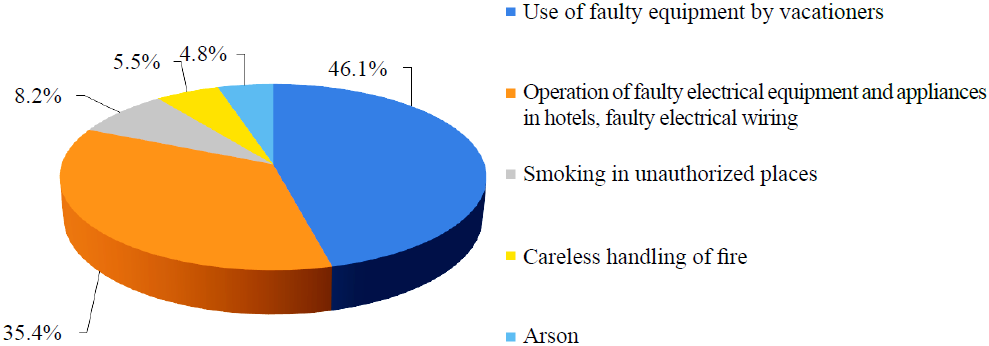
Fig. 3. Main causes of fires in hotels
Table 2
Main aspects of ensuring anti-terrorist protection of hotels
| Areas | Characteristics | Offer |
|---|---|---|
| Assessing the vulnerability of an object | Conducting an assessment of the vulnerability of an object by analyzing possible attack scenarios, identifying critical objects and zones, and assessing existing security measures will help identify potential threats and weaknesses in the hotel security system | Development of an action plan to improve anti-terrorist security, including the establishment of a pass system, organization of security of the territory, installation of video surveillance and alarm systems, etc. |
| Information awareness of personnel | Informing about anti-terrorist security measures, training | Organization of training in first aid skills, evacuation procedures, skills in understanding the signs of a potential terrorist attack |
| Cooperation with law enforcement agencies | Informing about anti-terrorist security measures, training | Organization of training in first aid skills, evacuation procedures, skills in understanding the signs of a potential terrorist attack |
| Psychological preparation | Systematic interaction and close cooperation of hotels with local law enforcement agencies | Organizing regular meetings, exchanging information, participating in joint training and exercises |
Control over compliance with the requirements for anti-terrorist protection of hotels is also carried out by the hotel owner at least once every 3 years. For violation of the requirements for anti-terrorist protection of facilities, administrative liability is provided for under Art. 20.35 of the Code of Administrative Offenses of the Russian Federation.
The increasing use of online booking and electronic payments have predetermined the importance of protecting guest information from unauthorized access and hacker attacks. Violation of personal data privacy can lead to serious consequences for both the guests themselves and the hotel’s reputation. Requirements for the processing, storage and transfer of personal data are regulated by Federal Law No. 152-FZ “On Personal Data”5.
Efficient technical and organizational measures will ensure the security of guest data, such as:
– data encryption;
– use of antivirus software;
– installation of firewalls;
– use of authentication and authorization systems (two-factor authentication);
– backup (in case of loss or damage of information due to a cyber-attack);
– training of personnel in the basics of information security;
– regular audits of information systems and data processing processes;
– presence of a clearly formulated privacy policy.
The use of data encryption, regular monitoring and updating of protection mechanisms will ensure a high level of security in accommodation facilities. The Labor Code of the Russian Federation stipulates that the employer, regardless of the field of activity, is obliged to ensure the safety of working conditions and labor protection that comply with state regulatory requirements (Article 22 of the Labor Code of the Russian Federation). Specific responsibilities of the employer in the field of labor protection are set out in Article 212 of the Labor Code of the Russian Federation, which can be conditionally divided into several types6 (Fig. 4).
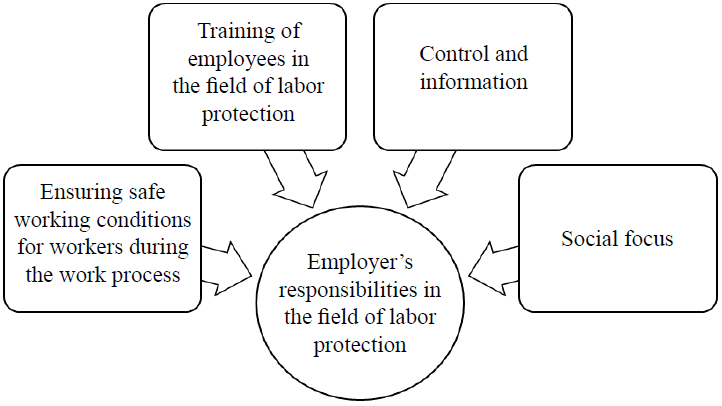
Fig. 4. Employer’s responsibilities in the field of labor protection
Ensuring safe working conditions for employees of hotel enterprises during the work process involves creating workplaces that comply with labor protection standards, providing collective and individual protective equipment, and conducting an assessment of professional risks.
Training of employees in the field of labor protection is implemented by organizing and conducting safety briefings, sending employees to advanced training courses on labor protection in the hotel industry. Duties in the field of control and information include regular inspections of the state of labor protection at the hotel enterprise and informing employees about possible dangers and precautions. Social obligations of the employer to the employee include the possibility of providing compensation and benefits to employees engaged in harmful or dangerous work, as well as the implementation of mandatory social insurance against accidents at work and occupational diseases.
Every day, hotel industry employees in the course of their professional activities face a high level of psychological pressure, emanating from both colleagues and management, as well as from guests. The results of such interactions can manifest themselves in the form of stressful and conflict situations, which have a significant impact on the stability of the psycho-emotional state of employees. The ability to cope with such loads, known as stress resistance, plays a key role in the successful professional activity of employees of accommodation facilities. Issues of occupational safety psychology in the hotel industry are aimed at studying physiological and psychological components, as well as their impact on the safety of the labor process (Fig. 5) [11].
Working in the hotel sector can be physically demanding, which can cause fatigue, decreased concentration, and increased likelihood of errors. The shift work system can disrupt human biological rhythms, causing sleep problems and decreased productivity. One of the main sources of stress and tension is the need for hotel staff to communicate with consumers (often dissatisfied consumers). Hotel employees often face claims and complaints that require a quick and high-quality solution. In such situations, employees have to remain calm and find the best solution to satisfy the client and reduce conflict situations.
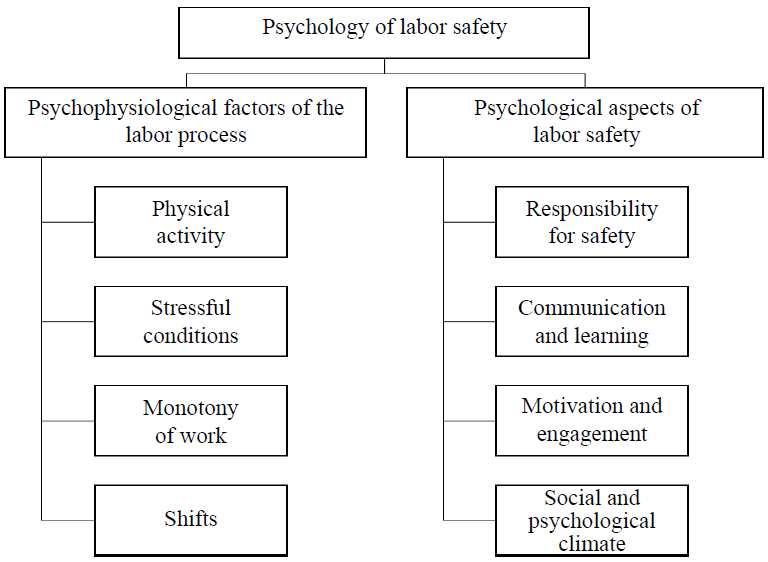
Fig. 5. Components of Occupational Safety Psychology
Emotional stress also plays an important role in the work of hospitality industry workers. Meeting different people, especially in stressful situations, requires high emotional output. Employees must be polite, friendly and ready to help each guest. They are often forced to hide their personal problems and emotions so as not to transfer them to their work and not to create a negative impression on guests.
High levels of stress and emotional tension can have a negative impact on the physical and mental health of hotel employees. Frequent cases of stress can lead to chronic fatigue, insomnia, apathy and depression. In addition, working under constant stress can lead to a decrease in productivity and quality of work. Hotels organize stress management and team building trainings to support the psycho-emotional well-being of employees: “Stress Management and Tension Relief Training”, “Emotional Management and Self-Regulation”, “Team Building Relay Race”, “Get to Know Your Colleague”.
Thus, ensuring safety in hotels is achieved through a set of measures aimed at protecting the health and well-being of guests and employees. Compliance with the requirements, rules, and technical regulations established by law will lead to minimizing the risk associated with the health of guests and personnel, and will also ensure its further successful development. Creating comfortable conditions for work and rest will allow the team to work effectively, without loss of productivity, which will certainly have a positive effect on the psycho-emotional state of employees and on the efficiency of business activities.
Discussion and Сonclusion. The main conclusions of the study are as follows.
Since ensuring the safety of guests, staff and hotel property is a key aspect of quality service, it is extremely important to organize fire safety in the hotel, taking into account the aspects presented in Fig. 6.
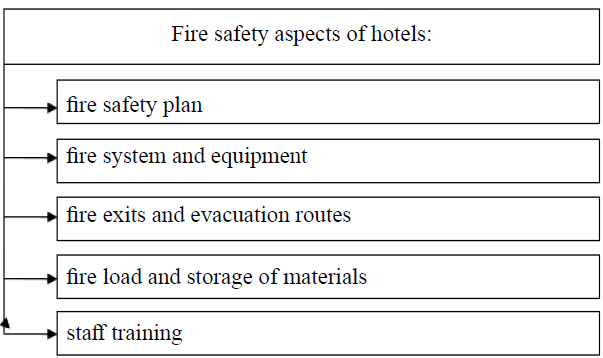
Fig. 6. Fire safety aspects of hotels
The use of effective fire extinguishing systems and strict adherence to fire safety regulations, as well as trained personnel, help prevent fires or minimize their consequences.
Every year we can state that the level of terrorist and criminal danger is increasing. Minimizing the probability of terrorist acts against accommodation facilities and minimizing their consequences can be achieved by implementing the following series of measures to ensure anti-terrorist protection of hotels:
– development of organizational and administrative documents on the organization of security, access control on the territory of the hotel;
– determination of officials responsible for the anti-terrorist security of the hotel;
– ensuring the training of employees for actions in the event of a threat of committing, committing a terrorist act on the territory of the hotel;
– organization of interaction with the territorial security agency, the territorial agency of the Ministry of Internal Affairs of the Russian Federation, the territorial agency of the Federal Service of the National Guard Troops of the Russian Federation at the location of the hotel;
– monitoring the situation developing in the area of the hotel.
Minimization of possible consequences of a terrorist act on the territory of a hotel is achieved by prioritizing human life and health over material and financial resources.
The following documents must be developed and stored within the framework of the organization of the occupational safety management system in the hotel:
– regulations on the occupational safety management system;
– regulations on the occupational safety service, including general information, a list of duties and responsibilities of employees and the goals set for the service;
– approved programs of activities aimed at ensuring safety for the current year, including a list of briefings conducted on actions in extreme situations (fire, earthquake, etc.);
– instructions on first aid in case of health problems or accidents in the form of a booklet;
– a set of journals on checking professional skills, passing scheduled briefings, as well as incidents that caused injuries or death;
– instructions on safety engineering for personnel of all categories;
– personnel health books.
Proposals for reducing unfavorable psychophysiological factors in the working conditions of hotel workers include:
– reducing the density of communication space by introducing an interactive information system that simplifies and automates routine processes and reduces the number of unnecessary interactions between employees;
– organizing the workspace and creating conditions for comfortable work of employees;
– professional training;
– motivational activities aimed at developing the desire of personnel to perform their duties conscientiously, efficiently and responsibly.
In conclusion, it should be noted that only a comprehensive approach, including fire safety, anti-terrorist protection, information security, security and psychology of personnel safety, will allow the implementation of the concept of ensuring the security of a modern hotel, the purpose of which is to ensure a comfortable and safe stay on the territory of the hotel complex for guests and staff of the establishment.
1 Resolution of the Government of the Russian Federation No. 1479 “Fire Safety Regulations in the Russian Federation” from 16.09.2020. URL: https://docs.cntd.ru/document/565837297 (accessed: 20.01.2025)
2 Federal Law of 21.12.1994 No. 69-FZ (as amended on 08.08.2024) “On Fire Safety” (ed. 19.10.2023). URL: http://pravo.gov.ru/proxy/ips/?docbody=&nd=102033559 (accessed: 20.01.2025).
3 Federal Law of the Russian Federation of 22.04.2012 No. 123-FZ (as amended on 25.12.2023) “Technical Regulations on Fire Safety Requirements”. URL: http://government.ru/docs/all/98843/ (accessed: 20.01.2025).
4 Order of the Ministry of Emergency Situations dated 11.18.2021 No. 806. URL: https://docs.cntd.ru/document/727122310 (accessed: 20.01.2025).
5 Federal Law “On Personal Data” dated July 27, 2006 No. 152-FZ (latest revision). URL: https://www.consultant.ru/document/cons_doc_LAW_61801/ (accessed: 20.01.2025).
6 “Labor Code of the Russian Federation” of 30.12.2001 No. 197-FZ (as amended on 08.08.2024). URL: https://docs.cntd.ru/document/901807664 (accessed: 20.01.2025).
References
1. Köseoglu M.A., Altin M., Chan E., Aladag O.F. What are the key success factors for strategy formulation and implementation? Perspectives of managers in the hotel industry. International Journal of Hospitality Management. 2020;89:102574. https://doi.org/10.1016/j.ijhm.2020.102574
2. Oborin M.S. Effective approaches to the development of domestic tourism in the context of the new economic reality. Tourism and hospitality: new concepts, opportunities and development tools. In: Collection of articles based on the materials of the International scientific and practical conference of the National Research University “BelSU”. Belgorod, April 15, 2022. Belgorod: Belgorod State National Research University: 2022. Pp. 110–115. (In Russ.)
3. Zobova E.V., Moreva S.N., Yakovleva L.A. Specifics of marketing research in tourism. Socio-economic phenomena and processes. 2017;12(3):51–57. (In Russ.)
4. Kazmina L.N., Makarenko V.S., Provotorina V.V., Grigorenko T.N. The Tourist and Recreational Cluster of Rostov Region: Socio-Economic Substantiation and Development Prospects. International Journal of Economics and Business Administration. 2019;VII(1):510–520. https://doi.org/10.35808/ijeba/297
5. Provotorina V., Kazmina L., Petrenko A., Ekinil G. Organization and functioning of accommodation facilities as a component of rural tourism infrastructure in the Rostov Region. E3S Web of Conferences. 2020:175:10002. http://doi.org/10.1051/e3sconf/202017510002
6. Peter E. Tarlow Tourism Security: Strategies for Effectively Managing Travel Risk and Safety. Chapter 3. Hotel and Motel Security. Butterworth-Heinemann; 2014, pp. 49–78. https://doi.org/10.1016/B978-0-12-411570-5.00003-9
7. Brossman Ch. Building a Travel Risk Management Program. Traveler Safety and Duty of Care for Any Organization. 7 – Hotel safety. Butterworth-Heinemann; 2016, pp. 127–145. https://doi.org/10.1016/B978-0-12-801925-2.00007-2
8. Yi-nan Hu. Research on the Application of Fault Tree Analysis for Building Fire Safety of Hotels. Procedia Engineering. 2016;135:523–529. https://doi.org/10.1016/j.proeng.2016.01.092
9. Pizam A., Ozturk A.B., Hacikara A., Zhang T., Balderas-Cejudo A., Buhalis D. et al. The role of perceived risk and information security on customers’ acceptance of service robots in the hotel industry. International Journal of Hospitality Management. 2024;117:103641. https://doi.org/10.1016/j.ijhm.2023.103641
10. Xuequn Wang, Jian Xu. Deterrence and leadership factors: Which are important for information security policy compliance in the hotel industry. Tourism Management. 2021;84:104282. https://doi.org/10.1016/j.tourman.2021.104282
11. Tretiakova T.N., Syromiatnikova Yu.A., Demirović Bajrami D., Gajic T. Psychoemotional status of hotel employees and their stress-resistance. Human. Sport. Medicine. 2021:21(S2):113–120. (In Russ.). https://doi.org/10.14529/hsm21s216
About the Authors
Antonina S. PetrenkoRussian Federation
Petrenko Antonina Sergeevna, Cand. Sci. (Sociology), Associate Professor, Department of Service, Tourism and Hospitality industry, Don State Technical University (1, Gagarin Sq., Rostov-on-Don, 344003, Russian Federation)
Valeria V. Provotorina
Russian Federation
Provotorina Valeria Valentinovna, Cand. Sci. (Economics), Associate Professor, Department of Service, Tourism and Hospitality industry, Don State Technical University (1, Gagarin Sq., Rostov-on-Don, 344003, Russian Federation)
Review
For citations:
Petrenko A.S., Provotorina V.V. A Comprehensive Approach to Security Management in Accommodation Facilities. Science Almanac of Black Sea Region Countries. 2025;11(3):32-41. https://doi.org/10.23947/2414-1143-2025-11-3-32-41















